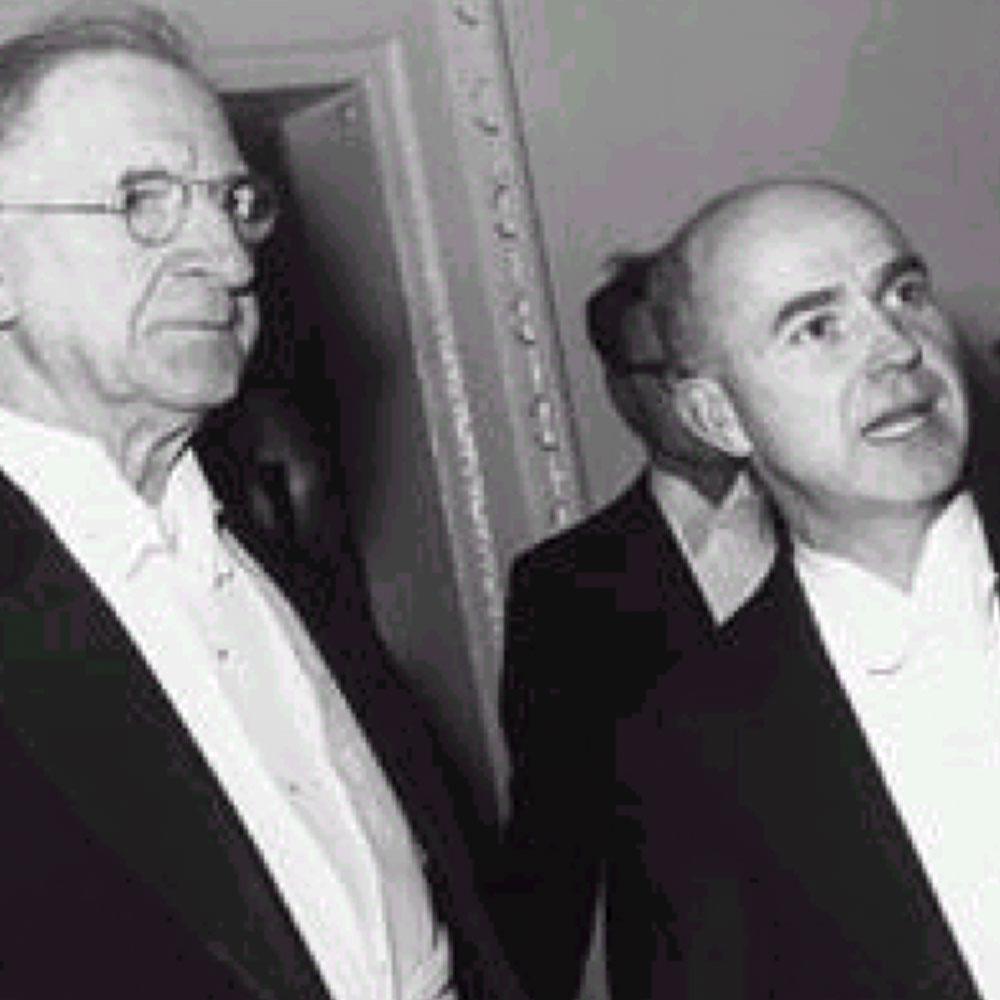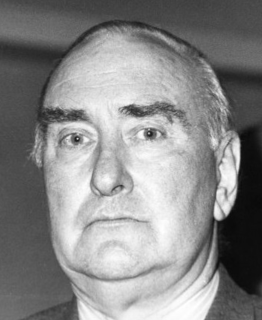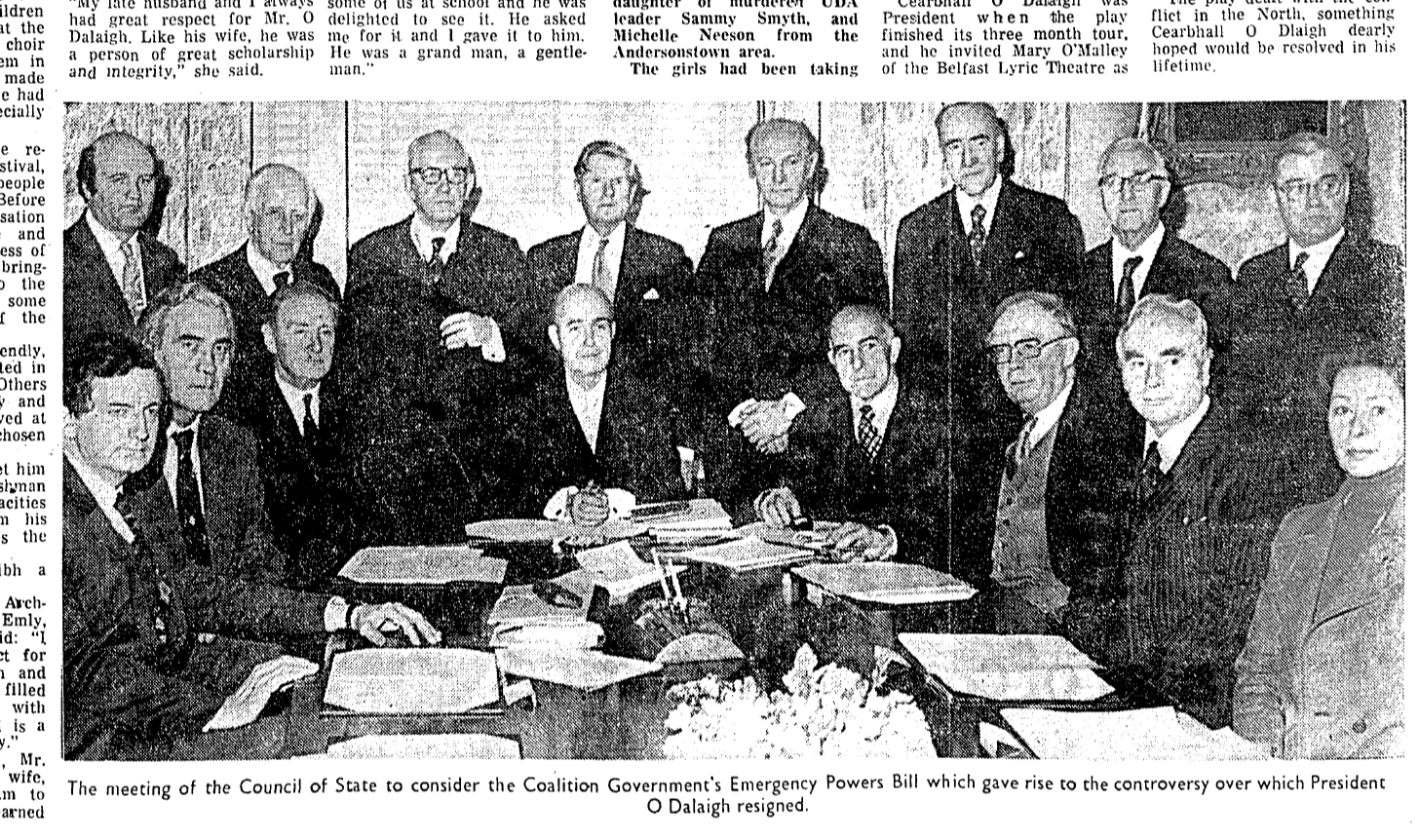When Fine Gael tried to take down a President

In sacrificing his own career as President, he made the position of future Presidents more secure and gave the office a status no Government will challenge or insult with impunity.
The Sunday Independent, 26 March 1978
In August 1976 the British ambassador in Ireland, Christopher Ewert Biggs and a civil servant, Judith Cooke, were killed, and two injured, when an IRA bomb hit the car they were travelling in. The Fine Gael/Labour government responded with the Emergency Powers Bill, which sought special powers to detain people suspected of certain crimes for seven days and suspended habeus corpus, the right to challenge illegal detention. To shield it from the obvious unconstitutional nature of these powers, the Dáil voted that a state of emergency existed.
The President, Cearbhall Ó Dálaigh, had ruled on many constitutional matters when Chief Justice of Ireland. He consulted with the Council of State, which disagreed with his belief that the legislation was unconstitutional. He then exercised the right to refer the bill to the Supreme Court to test its constitutionality. It was found to accord with the constitution, a decision former Supreme Court Justice Donal Barrington believes "will not rank as one of the court's best judgments." The President declared that he would sign the bill into law. On the same day, the IRA planted a bomb in the midland village of Mountmellick, Co. Laois in which a Garda was killed and several others severely injured.

At a private function, former British Prime Minister Edward Heath called the Irish President "a menace to civilisation." This extraordinary interference in the legitimate functions of a foreign head of state was soon openly supported by the Irish Minister for Defence Paddy Donegan, a close ally of Taoiseach Liam Cosgrave's. Donegan attended a routine function at an army barracks in the midlands on October 18th. Addressing a group of army officers, his speech quickly spiralled from government policy into a personal attack on the President of Ireland, calling him a "thundering disgrace" and saying that "Army must stand behind the State" – suggesting that the President was not. While some rumours over the years have suggested Donegan's language was even worse, the reported phrase was more than enough. The attack became public knowledge courtesy of the lone journalist present at the occasion.
Donegan's public statement the same evening reinforced the insult: "I regret the remarks which arose out of my deep feelings for the security of our citizens. I intend to offer my apologies to the President as soon as possible." Ó Dálaigh's private papers show he felt the relationship between the President and the Minister for Defence was "irrevocably broken." He expected Donegan's immediate resignation, or for the Taoiseach to fire him.
But Cosgrave refused to accept Donegan's resignation, simply passing on an apology from the minister and the government, but keeping the man who'd delivered the insult in his cabinet. Ó Dálaigh called this a "grave constitutional default."
The Taoiseach had a duty to keep the President informed and to uphold the dignity of the state. By not removing the minister, Cosgrave had deliberately isolated the President. He was left holding an office whose honour the government itself wouldn't defend. He was the Commander-in-Chief, yet his own Minister for Defence had publicly condemned him with no real consequences. On 21 October 1976, Fianna Fáil tabled a vote of no confidence in Donegan. After a short debate, it was defeated by five votes, 63 to 58, with Fine Gael and Labour all voting to protect the minister. For Ó Dálaigh, this may have been the last straw: regardless of how narrow the victory was, officially, the Dáil stood behind the insult.
On October 22nd, 1976, Cearbhall Ó Dálaigh announced his resignation from the office of President of Ireland. He was the first Irish president ever to do so.

In his resignation statement, he explained he was stepping down "to protect the dignity and independence of the presidency as an institution." He believed that if he stayed in office after such a public and unresolved insult, the presidency would be permanently weakened. Future presidents would be vulnerable, and the moral authority of the office would be shattered.
Following Ó Dálaigh's death eighteen months later, the Sunday Independent noted: "In sacrificing his own career as President, he made the position of future Presidents more secure and gave the office a status no Government will challenge or insult with impunity."
A video about Cearbhall Ó Dálaigh's presidency is coming soon.
